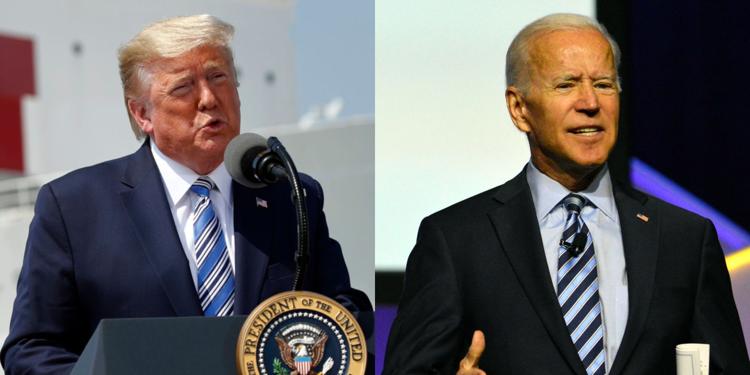Op-Ed: This Tax Day, taxpayers need relief and reform, not higher rates

President Donald Trump and former Vice President Joe Biden.
This upcoming Tax Day is a unique one, and not just because it’s well … in July. Taxpayers are busily filing and paying their taxes just four months before a presidential election that may radically shift the amount of taxes every American pays.
Former Vice President and presumptive Democratic nominee Joe Biden has grand plans to “raise revenue” (read: raise taxes), which would bilk hard-working Americans to the tune of trillions of dollars. While President Donald Trump has an admirable track record on tax reform, his plans are also far from perfect. Struggling individuals and a weakened economy cannot survive across-the-board tax increases and sky-high tariffs on everyday goods.
As can be expected, Biden is committed to overturning President Trump’s tax reform policies. In Biden’s telling, “irresponsible sugar-high tax cuts had already pushed us into a trillion-dollar deficit.” Therefore, he’s going to “get rid of the bulk of Trump’s $2 trillion tax cut.” At first glance, it appears that these tax hikes would just impact households at the top of the income ladder. Under the Biden plan for individual income tax rates, single filers would have to make more than $166,000 per year (or $330,000 for joint filers) in order to see higher taxes.
But the most painful tax increases for ordinary Americans are hidden away in the business provisions. In 2017, President Trump and Congress lowered the corporate tax rate from 35 percent (the highest in the developed world) to 21 percent. “President Biden” would hike the rate up to 28 percent, a move that would mean lower wages, less employment, and higher prices for consumers. A June 2020 analysis by American Enterprise Institute scholars Kyle Pomerleau, Jason DeBacker, and Richard W. Evans notes that, under the Biden tax plan, “The bottom 95 percent of taxpayers would generally face a tax increase due entirely to the corporate income tax increases.” This result is hardly surprising, given the overwhelming weight of evidence showing the harms of high corporate tax rates.
According to extensive modelling conducted by the Tax Foundation, raising the corporate tax rate to 28 percent would destroy 187,000 jobs and axe wages by nearly 1 percent. And, 2019 research from University of Chicago, Northwestern University, and City University of Hong Kong scholars reveals that more than a third of the corporate tax burden falls on consumers. According to their estimates, “A one percent increase in the corporate tax rate leads to an increase in retail product prices of approximately 0.24 percent.”
A high corporate tax rate would also encourage corporate inversions where companies move the paperwork of the company overseas to avoid domestic taxes. These inversions were popular in the United States when the corporate tax rate was 35 percent (which could exceed 40 percent when coupled with state rates). In the pre-tax reform days, Burger King purchased Canadian chain Tim Horton’s for $11 billion. The Washington Post noted at the time that, “The fast food giant stands to save as much as $1.2 billion in taxes over the next three years by moving its headquarters from the United States to Canada.” That meant billions of dollars were headed for Canadian coffers rather than the U.S. Treasury.
Biden’s plan to raise the corporate (and other tax) rates is problematic to say the least. That’s not to say, however, that President Trump’s post-reelection plans are a walk in the park. By all indications, Trump would continue his disastrous trade tax policy in his second term. Currently, the Trump administration maintains onerous 25 percent trade taxes on imports ranging from aircraft engine parts to frozen swine meat to water heaters. In total, more than $350 billion worth of imports are impacted by the Trump administration’s heavy hand, and consumers must pay $57 billion extra annually for goods and services as a result. That amounts to roughly $440 for each household in America. Unless President Trump resolves to lower these costs, the continued, wanton taxation of imports won’t do him any favors on Election Day. Biden must similarly reassure voters that he won’t be just another tax-and-spend politician in elected office.
Households across the country are struggling as it is to cope with the coronavirus pandemic. The last things they need are price hikes, lower wages, and fewer job opportunities. This Tax Day, voters must hold their presidential nominees accountable and demand further tax relief and reform. Struggling Americans cannot afford higher bills and will vote to avoid endless taxation.
Ross Marchand is the Vice President of Policy for the Taxpayers Protection Alliance

